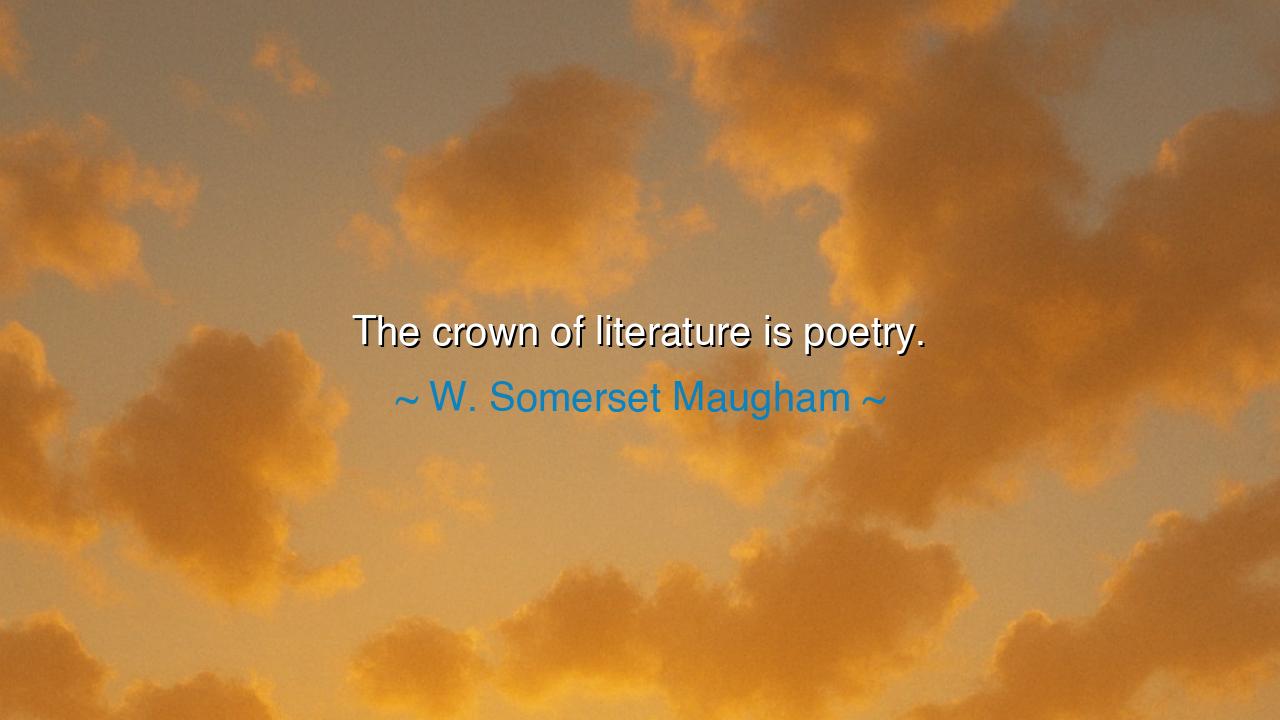
The crown of literature is poetry.






“The crown of literature is poetry.” So proclaimed W. Somerset Maugham, and his words strike like the toll of a great bell that echoes across the halls of time. All forms of writing—history, philosophy, drama, prose—are noble servants in the kingdom of letters. Yet poetry sits upon the throne, wearing the diadem of beauty and truth. For poetry is not mere ornament; it is the distilled essence of thought, emotion, and vision. Just as a crown gathers jewels into a single circle of radiance, so poetry gathers the noblest elements of language into a form both eternal and sublime.
The ancients themselves understood this hierarchy. Long before chronicles were written or treatises inscribed, the first words of mankind’s spirit were sung. Homer’s Iliad and Odyssey, the Vedas of India, the Psalms of David—these were the wellsprings from which later literature flowed. The stories of nations, the laws of kings, the philosophies of sages—they all drew strength from the poet’s voice. Truly, when Maugham declares poetry to be the crown, he reminds us that it is not only the most exalted, but also the most foundational.
Consider the example of Dante Alighieri. In an age when Europe reeled with conflict, he forged the Divine Comedy—a poem that was at once philosophy, theology, history, and vision. Scholars and clerics wrote treatises in abundance, but none endured with the power of Dante’s verse. Why? Because he did not simply explain; he exalted. He set truth into fire and rhythm, so that even centuries later, the world bends the knee to his work. Dante proved that where philosophy instructs and history records, poetry crowns them all, giving them splendor and immortality.
We may look, too, to the life of Alexander Pushkin, the father of Russian literature. His nation had prose, its laws, its chronicles, its folk tales—but it was Pushkin’s poetry that awakened the Russian soul. His verses became a crown not only upon literature but upon the identity of a people. Soldiers, peasants, nobles—all found themselves mirrored in his lines. Without him, Russian letters would have been strong; with him, they became radiant. Here again we see Maugham’s wisdom: poetry elevates, it crowns, it gives majesty.
This truth carries a deeper meaning beyond books. For if poetry is the crown of literature, then in every human endeavor there must be a crown—a part that lifts the whole from necessity to greatness. Bread feeds the body, but song feeds the heart. Laws govern society, but justice crowns it. Knowledge fills the mind, but wisdom crowns it. Poetry is not only the ruler of words—it is the symbol of the spirit that turns all labor into glory.
The lesson is this: seek the crown in all you do. Do not settle for mere survival, or mere function, or mere utility. Let there be poetry in your speech, in your craft, in your living. To write a letter, let it breathe sincerity. To work with your hands, let your labor carry dignity. To love another, let your affection rise beyond duty into devotion. In all things, search for that which crowns the rest—the act or word that gives beauty and completion.
Therefore, children of wisdom, remember Maugham’s teaching. Literature without poetry is like a kingdom without its sovereign—rich, perhaps, but unfulfilled. And life without poetry, without that crowning element of beauty, is like a body without its soul. Strive always to place the crown upon your days. Read the poets, yes, but more than that: live poetically. Speak with truth, act with grace, dream with boldness. For in so doing, you weave your own crown, and wear it before the generations yet to come.






KNNguyen thi kim ngan
Maugham’s statement that poetry is the crown of literature seems to imply that it holds the highest value in the literary world. But what makes it so elevated? Is it the power of words compressed into verses, or the emotional depth poetry often conveys? Can a reader really connect with poetry more than other forms of writing, or is this just a perspective that comes from a love of language?
NMNGoc may
When Maugham calls poetry the crown of literature, I wonder what he means by 'crown.' Does it mean the most important or the most difficult to achieve? Perhaps it’s because poetry condenses emotion and meaning in a way that no other genre does. But does that make it superior to prose, or just different? I’d love to hear your take on how poetry’s form and function set it apart in the literary world.
TMthao mai
I’m intrigued by Maugham’s comparison of poetry to a crown. Does this mean that poetry is the pinnacle of all literature, or simply that it holds a unique position in how we experience language? I’ve always thought of prose as more accessible, while poetry can be a bit more elusive. What do you think? Does poetry offer something that no other genre of literature can, or is it more about the way we connect with it?
L1Vang Lop 11B4
Maugham’s assertion that poetry is the crown of literature feels like a bold statement. What makes poetry so special compared to other forms of writing? Is it because poetry can capture complex emotions in a condensed form, or is it that poetry transcends simple storytelling and ventures into deeper, often more abstract realms? I’m curious about what qualities in poetry elevate it above other literary forms in Maugham’s view.